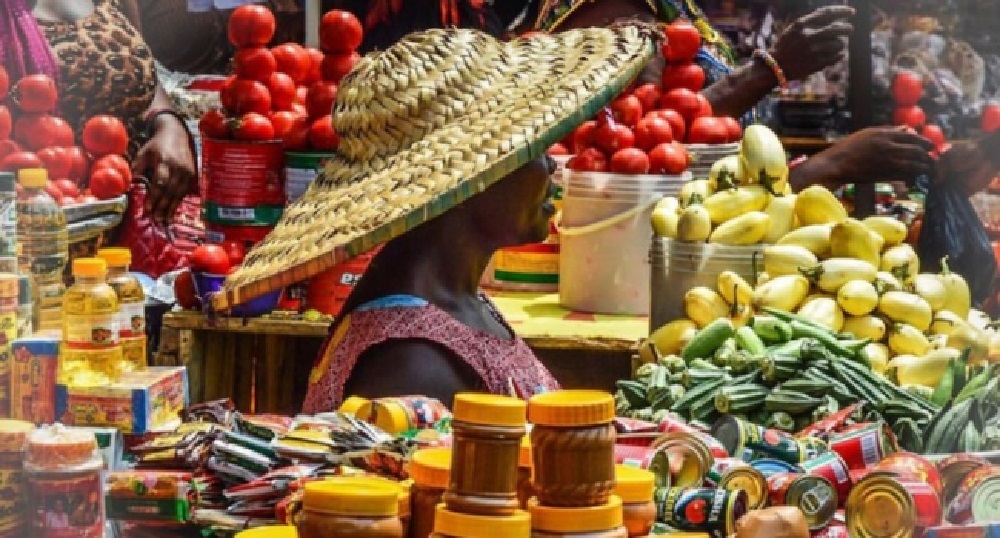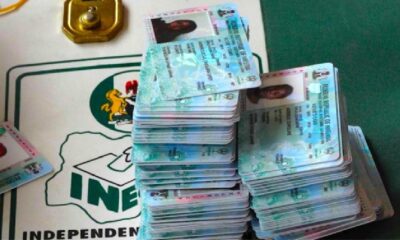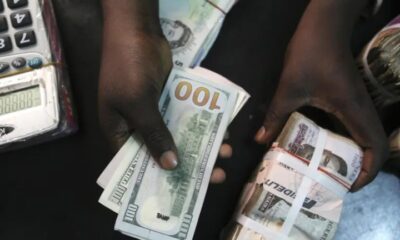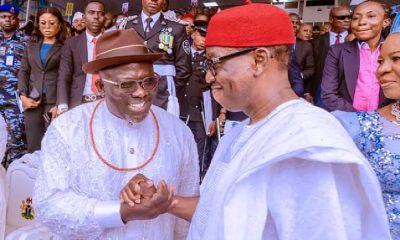Economy
CBN sanctions nine banks for hoarding cash

NINE Deposit Money Banks (DMBs) are to pay a N1.35 billion fine for failing to adequately load their Automated Teller Machines (ATMs) during the Yuletide.
The Central Bank of Nigeria (CBN) which slammed the sanction, said each of the banks would pay N150 million as fine for non-compliance with the regulator’s cash distribution guidelines, following spot checks conducted at their branches.
The sanctioned banks are: Fidelity Bank Plc; First Bank Plc; Keystone Bank Plc; Union Bank Plc; Globus Bank Plc; Providus Bank Plc; Zenith Bank Plc; United Bank for Africa Plc and Sterling Bank Plc.
A statement by the CBN said the fines had been enforced, stressing that the commitment to guaranteeing seamless cash flow, particularly during periods of high demand, would be sustained.
According to the apex bank, the fines would be debited directly from the affected banks’ accounts.
The statement by the CBN Acting Director, Corporate Communications, Mrs. Hakama Sidi Ali, reads: “Ensuring seamless cash flow is paramount to maintaining public trust and economic stability.
“The CBN will not hesitate to impose further sanctions on any institution found violating its cash circulation guidelines.”
The CBN also disclosed ongoing investigations into cash hoarding and rationing by bank branches and Point-of-Sale (PoS) operators.
Mrs. Ali said the CBN is collaborating with security agencies to address illegal cash sales and enforce the PoS operators’ daily cumulative withdrawal limit of N1.2 million.
Economy
SEE current exchange rate of the Dollar to Naira

What Is the Dollar to Naira Exchange Rate at the Black Market (Aboki FX)?
Here is the Dollar to Naira exchange rate at the parallel market, popularly known as the black market (Aboki fx), for Tuesday, April 23, 2025.
You can exchange your dollars for naira at the following rates:
Black Market Exchange Rate (Lagos – April 23, 2025):
According to sources at the Bureau De Change (BDC), the exchange rate at the Lagos parallel market saw traders buying at ₦1610 and selling at ₦1620 per US dollar.
It’s important to note that the Central Bank of Nigeria (CBN) does not recognize the black market. The CBN advises individuals seeking foreign exchange transactions to do so through their banks.
Dollar to Naira Exchange Rates
Market Type Buying Rate Selling Rate
Black Market ₦1610 ₦1620
CBN Official Rate ₦1591 (Low) ₦1606 (High)
Note: Forex rates vary across dealers and regions, and actual rates may differ from those listed.
Meanwhile, the Nigeria Customs Service (NCS) has announced the seizure of 298 smuggled items worth ₦7.6 billion between January and March 2025. The NCS also disclosed that it generated a total revenue of ₦1.75 trillion in the first quarter of the year.
Economy
Volvo announces termination of 800 U.S. workers, cites tariff, market decline

Volvo Group has announced plans to lay off up to 800 workers at three of its U.S. facilities over the next three months, citing ongoing market uncertainty and declining demand exacerbated by tariffs introduced under the administration of President Donald Trump.
The affected locations include the Mack Trucks plant in Macungie, Pennsylvania, as well as Volvo Group sites in Dublin, Virginia, and Hagerstown, Maryland.
In a statement on Friday, Volvo Group North America confirmed that between 550 and 800 employees would be impacted.
The company, a subsidiary of Sweden’s AB Volvo, employs nearly 20,000 people across North America.
The layoffs come amid wider turmoil in the automotive and manufacturing sectors, as shifting U.S. trade policy and a series of tariffs continue to drive up production costs. Economists have pointed to the uncertainty surrounding Trump’s trade strategy as a factor undermining both business and consumer confidence, with concerns mounting over a potential economic slowdown or recession.
According to Volvo, the company is grappling with a decline in heavy-duty truck orders, driven by instability in freight rates, anticipated regulatory changes, and the growing financial burden of tariffs. “We regret having to take this action, but we need to align production with reduced demand for our vehicles,” a company spokesperson stated in an email quoted by Reuters.
Volvo’s announcement marks another blow to an industry already navigating a complex web of supply chain challenges and fluctuating market conditions, with other manufacturers also warning of potential cost hikes and disruptions tied to global trade disputes.
Economy
Inflation surged to 24.23% due to escalating cost of living

Inflationary pressure has reappeared as Nigerians grapple with increases in average costs of basic food items and energy.
For the first time after the rebasing of the Consumer Price Index (CPI), headline inflation spiked in March to 24.23 per cent – 105 basis points above the 23.18 per cent recorded in the previous month.
The National Bureau of Statistics (NBS) yesterday indicated that the rate of increase in the average price level was higher in March than the level in February.
In January, the NBS updated the weight and price reference periods in calculation of the CPI to make the inflationary gauge more reflective of changes in consumption patterns and the economy generally.
The rebasing did not only brought the base year closer to the current period from 2009 to 2024, it also introduced some critical methodology changes to improve the computation processes.
After the rebasing, inflation dropped from 34.80 per cent in the pre-rebased period of December 2024 to 24.48 per cent in January 2025. It dropped further to 23.18 per cent in February.
In its latest report, NBS recorded 186 basis points changes between the monthly inflation rate, with the month-on-month rate rising from 2.04 per cent in February to 3.90 per cent in March.
The NBS attributed the spike to the rise in costs of food and alcoholic beverages, fuels and electricity, among other items.
Analysts at CardinalStone said the resurgence was due to renewed foreign exchange (forex) pressures amid heightened global risk-off sentiment.
They pointed at foreign portfolio investments (FPIs) outflows and increased dollar demand, which saw naira dropping by 2.4 per cent in March.
Experts also cited increase in price of Premium Motor Spirit (PMS) or petrol, following the temporary suspension of the naira-for-crude swap arrangement.
Food inflation rate stood at 21.79 per cent in March 2025. The composite food index decreased to 21.79 per cent from 23.51 per cent.
Core inflation, which excludes volatile agricultural produce prices and energy, rose to 24.43 per cent from 23.01 per cent.
Specifically, the month-on-month food inflation rose by 50 basis points from 1.67 per cent in February to 2.18 per cent in March.
The NBS attributed the increase in food inflation to increases in the average prices of basic food items including ginger, garri, broken rice, honey, crabs, potatoes, plantain flour, periwinkle and pepper amongst others.
On a state-by-state basis, food inflation was higher in Oyo with 34.41 per cent; Kaduna (31.14 per cent) and Kebbi (30.85 per cent).
On the other side, the 9.61 per cent recorded by Bayelsa; Adamawa (12.41 per cent) and Akwa Ibom (12.60 per cent), were the lowest inflation rates.
Analysts expressed concerns that the resurgent inflationary pressure might lead to renewed tightening stance by the Central Bank of Nigeria (CBN).
CBN Governor Dr. Olayemi Cardoso, had at the end of the first Monetary Policy Committee (MPC) meeting in 2025, reiterated the apex bank’s commitment to orthodox monetary policies, noting that the apex bank’s stance will be reflective of the inflationary trend.
With inflation rate dropping in February, the MPC had decided to maintain all key monetary policy parameters, including the Monetary Policy Rate (MPR) at 27.50 per cent, the asymmetric corridor around the MPR at +500/-100 basis points, the Cash Reserve Ratio (CRR) at 50.00 per cent for Deposit Money Banks and 16.00 per cent for Merchant Banks, and the Liquidity Ratio at 30.00 per cent.
Clarifying the impact of the rebased CPI, Cardoso had explained that the lower inflation figure should not be misinterpreted.
He underlined the need to analyse more data before drawing comparisons, noting that the CBN is currently assessing the figures and will provide further guidance in due course.
The CBN boss stressed the critical importance of collaboration between monetary and fiscal authorities in sustaining recent economic improvements.
Addressing concerns about the impact of elevated borrowing costs on economic growth, the CBN governor assured that the apex bank’s primary objective is to stabilize the foreign exchange and financial markets.
He expressed confidence that such stability would attract increased foreign investments, stimulating the much-needed economic growth.
Cardoso also highlighted the competitiveness of the Nigerian currency, which has spurred growing interest from international investors.
-

 News23 hours ago
News23 hours agoINSECURITY! Enough is enough, Tinubu tells security chiefs, NSA
-

 News23 hours ago
News23 hours agoJust in: Air Peace suspends all scheduled flights nationwide
-

 News22 hours ago
News22 hours agoINEC moves to legalise voting without PVC
-

 Economy14 hours ago
Economy14 hours agoSEE current exchange rate of the Dollar to Naira
-

 News18 hours ago
News18 hours agoJust in: PDP can never die over gale of defection -Hon Teejay Yusuf insists
-

 Politics23 hours ago
Politics23 hours agoFCT minister, Wike, Uzodinma hail Okowa/Oborevwori defection to APC
-

 News11 hours ago
News11 hours agoJUST IN: Rivers Sole Administrator Ibas Shun Reps Panel
-

 Opinion20 hours ago
Opinion20 hours agoCBN under Cardoso and $6.83 Billion balance of payments surplus in 2024 that signals economic resurgence
















